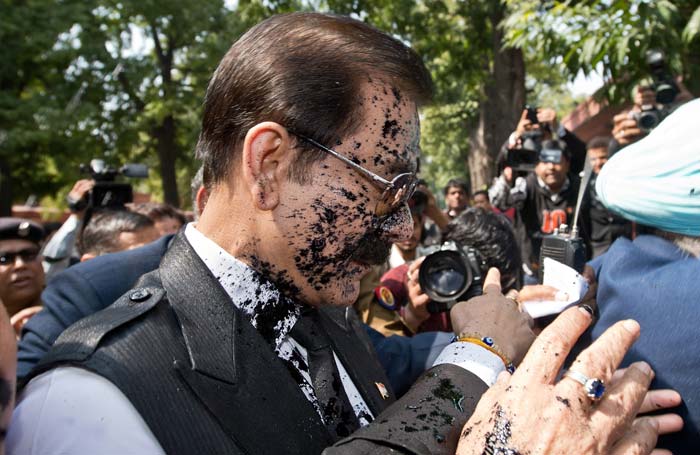Subrata Roy of Sahara India Parivar is one of the most famous, admired and influential role models for rural and small-town folks in north India. His personal relations with politicians, Bollywood stars and cricketers has always kept him in the media’s limelight. His company was the main sponsor of the Indian national cricket team for many years. Subrata Roy has also received various awards and titles from the government as well as non-governmental organizations. Nonetheless, he is now in jail for not being able to pay back Rs 20,000 crores of investor’s money as directed by the Supreme Court of India. He cheated almost 3 crore investors of their money, which is more than the population of many states in India. Roy enjoys a cult-like following by many people in north India which was visible during the protests against his arrest by the Lucknow police.
Subrata Roy started his business from Gorakhpur in Uttar Pradesh. He relied mainly on small investors to raise capital for his businesses. His investors were mainly concentrated in villages and small towns in and around that region. Some of his investors were earning hardly 2000-3000 rupees per month and used to deposit 10-20 rupees daily in their Sahara accounts. This was the time when the majority of the people in the villages of India did not have a bank account and thus no destination to deposit their small savings. The interest Sahara provided to these investors was very small like 1 or 2 percent. Still, investors used to deposit because they trusted Sahara agents who were generally people from within their own village or locality. The investors had a sense of security for their money and they could get the sum amount of their deposits which could be used to purchase household goods like TVs, fridges or any other items that required more money than their monthly savings.
The problems with Sahara started when Sahara Prime City, a real estate venture of the group, filed a Draft Red Herring Prospectus (DRHP) with SEBI in September 30, 2009. SEBI is the regulator for the securities market in India. DRPH is an initial document that a company needs to file with SEBI to bring out an initial public offer (IPO) of shares to public investors. SEBI received complaints alleging illegal means used by two firms Sahara India Real Estate Corp Ltd (SIRECL) and Sahara Housing Investment Corp Ltd (SHICL) in the issuance of certain bonds, called OFCDs (Optionally Fully Convertible Debentures), to the public throughout the country for many months. This was a violation of the rule that a company has to register with SEBI before going public. SEBI passed an interim order against the two companies on November 24, 2010, asking them to refund the money collected from investors. Sahara challenged the SEBI order in the court but it lost the case. The Court directed Sahara to deposit the outstanding amount of over Rs 24,000 crore with SEBI as a refund to the investors. It paid the first instalment of Rs 5,120 crore but failed to pay the rest of the money. SEBI then passed orders on February 13, 2013, to attach bank accounts and other properties of the group and later issued summons for the personal appearance of Subrata Roy and other three directors before it. In April 2013, SEBI finally closed its file on Sahara Prime City, whose planned IPO had kick-started this long-running battle.
Recently SEBI sold a 75 percent stake in Sahara in New York‘s most iconic buildings, the Plaza Hotel, to arrange funds to pay back the investors. Qatar’s state-owned Katara Holding is buying full ownership of the hotel, for Rs 4,000 Crores (600 million). The other properties of Sahara are also being sold to collect the funds to pay back investors. The Enforcement Directorate (ED) has registered a case of money laundering against Sahara as almost 95 percent transactions of money between the group companies and the investors were done in cash and the respective taxes were not paid. The rise and fall of Subrata Roy among many things symbolizes how easily uninformed poor people can be fooled into idolising the wrong role models.
